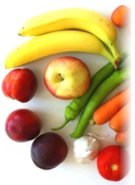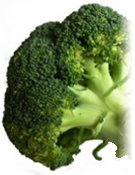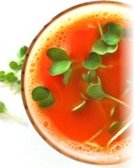How to Improve Gallbladder Health & Fight Gallstones Naturally
A healthy gallbladder is important to human health as this small, bladder-like organ helps your body digest fats by releasing bile, a fat-digesting fluid. However, sometimes bile can turn into hard, stone-like deposits known as gallstones. Untreated, these little stones can cause excruciating pain and serious health complications. While existing gallstones require a visit to the doctor's office, there are plenty of natural preventive measures that can help prevent gallstones and improve overall gallbladder health. In this online guide, you will find plenty of tips on how to keep your gallbladder healthy and fight gallstones naturally.
Before you jump into the diet, food and recipe sections of this Guide (see below), let's take a look at what gallstones are. Gallstones, also known as bile stones or biliary calculi, are very common, with an estimated one million Americans developing them each year. The presence of gallstones is known as cholelithiasis. Gallstones develop when bile hardens and turns into small, pebble-shaped substances in the gallbladder. Bile (also known as gall) — a liquid made by the liver — contains water, fats, cholesterol, bile salts, proteins, and a waste product called bilirubin. The body needs bile to digest fats and stores it in the gallbladder until it is needed. If the bile contains too much cholesterol, bile salts, or bilirubin, it can turn into gallstones. About 80% of gallstones are made of hardened cholesterol ("cholesterol stones"). When excess bilirubin is the cause of a gallstone, the stone is called a "pigment stone" because of its black or dark brown color.
The majority of the people with gallstones are completely unaware of these small substances in their gallbladder. Most people only find out they have gallstones when a stone gets stuck in the outlet of the tube that leads to the gallbladder (called the cystic duct). This can result in severe pain in the upper right abdomen or tenderness under the ribs on the right side, and can be accompanied with nausea, vomiting, jaundice, and/or fever. If the duct is not quickly unblocked, severe – even fatal – damage can occur.
Although anyone can develop gallstones, older and overweight people are more likely to get them. Furthermore, women are at greater risk of developing gallstones. This is believed to result from changes in estrogen levels associated with pregnancy, the birth control pill or hormone replacement therapy. High estrogen levels may prevent the gallbladder from contracting properly, making it more difficult for the gallbladder to expel gallstones as they begin to form.
The precise cause of gallstones is not known, but both genetic background and lifestyle factors (such as nutritional factors) are thought to play a role in the development of gallstones. To learn all about dietary habits, nutrients and foods that can help prevent gallstones and keep your gallbladder healthy, check out the diet, food and recipe sections of this Anti-Gallstone Nutrition Guide:

Gallbladder Diet Plan: 6 Tips for Preventing Gallstone Attacks
In this section, you will learn how certain nutritional habits – such as stepping up your magnesium intake or eating less animal-based protein and fats – can improve the health of your gallbladder and keep gallstones away.
View Diet Tips
Good Foods for Preventing Gallstones
Learn which foods have gallstone-fighting properties and start incorporating them into your daily eating plan. As you will see, there's no need to head to a specialty food stores – the best anti-gallstone foods are readily available at regular supermarkets.
View Food List
Healthy Recipes for Preventing Gallbladder Stones
Treat your tastebuds to scrumptious wholewheat-walnut muffins – and also your gallbladder will be happy. Or how about a bowl of apple and onion soup which is naturally rich in gallstone-fighting nutrients? To view these recipes and other recipes designed to improve gallbladder health, click on the link below.
View Recipes
